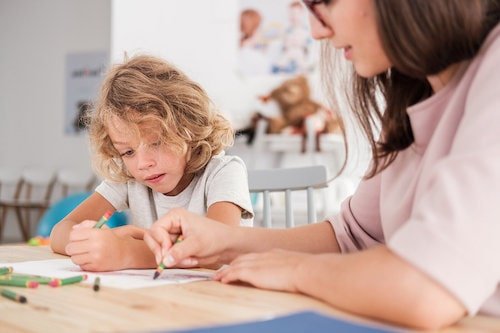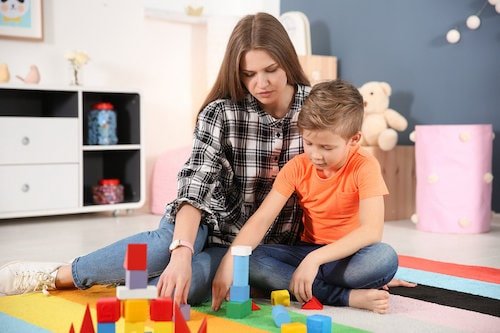Play Therapy and Child Mental Health
Written by Michele Kamerman, M.A., LPC, RPT
Registered Play Therapist
Your child is having a hard time.
They’re exhibiting Behaviors and emotions you’ve never seen before.
You’re worried about your child’s behavior at home, at school, or with their peers.
Has your child ever sat down on the couch to discuss their feelings and concerns with you? Most likely, the answer is no. Many children do not have the verbal skills and language to do that. Children can communicate their concerns and feelings through play. Play is a child’s language. Children can tell us a lot through play. They can also work through their stress, anxiety, or trauma by playing and learning new skills.
What is play therapy?
The founder of the Child-Centered Play Therapy model, Garry Landreth, defines play therapy as “As a dynamic interpersonal relationship between a child (or person of any age) and a therapist trained in play therapy procedures who provides selected play materials and facilitates the development of a safe relationship for the child (or person of any age) to fully express and explore self (feelings, thoughts, experiences, and behaviors) through play, the child's natural medium of communication, for optimal growth and development.”
In other words, play therapy is to children what talk therapy is to adults. It’s helpful to think of the toys as words. Your child will express themselves and the things they cannot say by playing. Their play therapist will observe them and play with them to learn more about what’s going on and how to best help them overcome the challenges they’re experiencing. Then, through play therapy, your child can learn to problem-solve and change their behavior.
What Happens in Play Therapy?
Play therapy could involve playing with toys. Or, it could involve things like expressive art, sand tray therapy, or filial therapy. Traditional play therapy is geared towards younger children. But, expressive art and sand tray could be used by adults as well. Filial therapy is a structured parent-child program that focuses on strengthening the parent-child relationship.
A play therapist may use a non-directive approach or a directive approach depending on the need and on the age of the client. Usually, when the client is younger, the therapist will let the child lead the play as the therapist observes. When the child is a bit older, the therapist may take a directive approach and take the lead in the session. Your therapist will help guide your child to use mediums such as books, art, puppets, role-play, etc. to help your child make progress expressing their emotion and learn new skills.
Who could benefit from play therapy?
Any child could benefit from play therapy since it’s a safe way for a child to express themselves. Play therapy can be used as a treatment for several circumstances:
Anxiety
Depression
Emotional dysregulation such as displaying anger inappropriately
Life transitions such as divorce or moving
Family concerns
School behavior issues
Problematic behaviors from ADHD and/or Autism
Social issues
Grief
Abuse
Trauma
How does play therapy work?
A play therapist meets the child where they are emotionally and developmentally. At first, your child’s therapist will take the non-directive approach. This helps your child to feel more comfortable and to build rapport. Their therapist will play alongside them and observe how they interact with the materials. The toys act as words your child may not be able to share. So, their therapist will observe, track your child’s actions, and note feelings being played out in the session. This approach will help your child become less guarded and feel more comfortable sharing thoughts and feelings. Your child will use the toys to express themselves, process, and problem solve. Then after getting an idea of what’s going on and causing your child distress, their therapist will use their observations to formulate a treatment plan and offer parenting strategies.
Is there parent involvement?
Your child’s therapist will schedule a separate time for you to get feedback, and discuss parent strategies, and behaviors at home and school. Your child’s therapist may also invite the parent/s into the session to teach strategies and coping skills that your child can implement at home. A team effort from the therapist, parents, and child has the greatest impact on achieving therapeutic progress.
Begin Play Therapy in Houston, TX
If you feel like your child could benefit from play therapy, please give us a call at 713-380-1151. We would be happy to help your child learn new skills to better cope with life’s challenges. Follow these steps to begin therapy in Houston, TX:
Contact our counseling clinic to set up a free phone consultation,
Meet with one of our play therapists,
Begin play therapy and help your child learn valuable life skills
About the Author:
Michele Kamerman is a Licensed Professional Counselor and a Registered Play Therapist. She earned her Bachelor’s degree in Psychology from Baylor University and her Master’s degree in Clinical Mental Health Counseling from the CACREP accredited program at St. Mary’s University in San Antonio. Michele has significant experience working in a private practice setting as well as schools and shelters. Besides her individual work, Michele also has extensive experience with developing and facilitating social skills classes for elementary school children. Click here to book a session.


